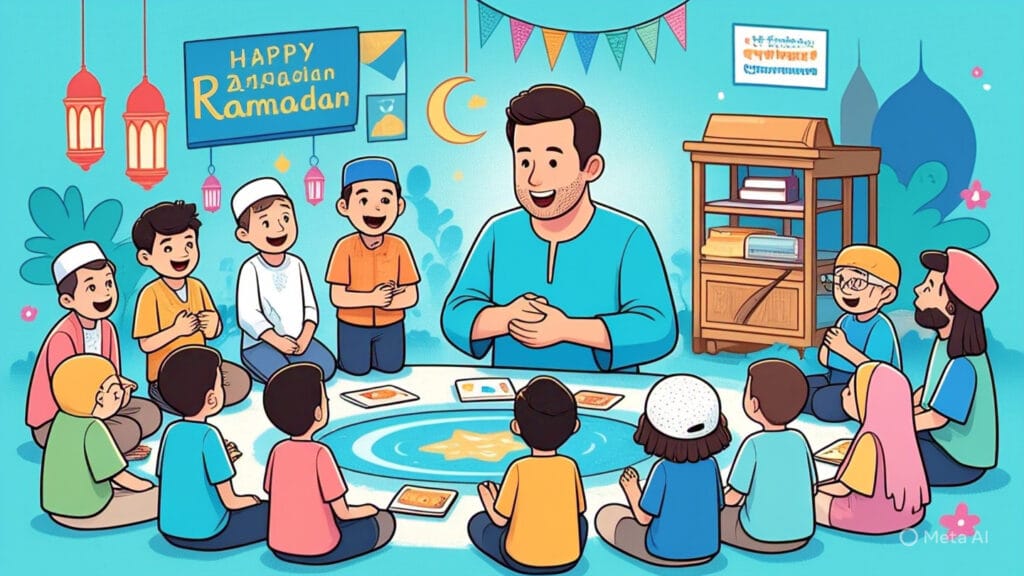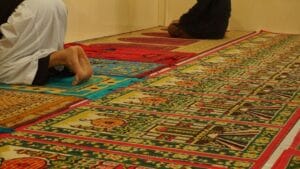Ramadan is a sacred month in Islam, filled with fasting, prayer, charity, and community. For children, understanding the significance of Ramadan can be both exciting and meaningful when approached with creativity and joy. Teaching kids about Ramadan in a fun, engaging way helps them connect with their faith, build lifelong values, and create cherished memories. This comprehensive guide offers practical, age-appropriate activities, crafts, stories, and tips to make learning about Ramadan unforgettable for kids. Whether you’re a parent, teacher, or community leader, these ideas will inspire children to embrace the spirit of Ramadan with enthusiasm.

Why Teaching Kids About Ramadan Matters
Ramadan is more than fasting from dawn to dusk; it’s a time to grow spiritually, practice gratitude, and strengthen family and community bonds. For children, learning about Ramadan fosters:
- Faith and Identity: Understanding Islamic traditions builds a strong sense of belonging.
- Empathy and Compassion: Fasting and charity teach kids to care for others.
- Discipline and Gratitude: Ramadan encourages self-control and appreciation for blessings.
- Joyful Memories: Fun activities create positive associations with the holy month.
By making Ramadan accessible and enjoyable, you help kids internalize its values in a way that resonates for years to come. Below, we share creative ways to teach kids about Ramadan, tailored to different age groups and learning styles.
Understanding Ramadan: A Kid-Friendly Explanation
Before diving into activities, it’s important to explain Ramadan in simple terms. Here’s a child-friendly summary you can share:
“Ramadan is a special month when Muslims fast—no eating or drinking—from sunrise to sunset. It’s like a time to recharge our hearts and get closer to Allah. We pray more, read the Quran, and help others by giving charity and being kind. At the end, we celebrate Eid al-Fitr with yummy food, gifts, and fun!”
For younger kids (ages 3–6), focus on the basics: fasting, praying, and being kind. For older kids (ages 7–12), add details about the Quran’s revelation, the importance of charity, and the spiritual goals of Ramadan.
Read more:
Fun Ways to Teach Kids About Ramadan
1. Storytelling: Bring Ramadan to Life
Stories are a powerful way to capture kids’ imaginations and teach lessons. Share age-appropriate tales that highlight Ramadan’s values.
- Prophet Stories: Tell stories of Prophet Muhammad (peace be upon him) emphasizing kindness, like how he shared food with the poor. Use colorful books like The Life of the Prophet by Saliha Umm Yahya.
- Ramadan Adventures: Create a fictional character, like “Rami the Ramadan Explorer,” who learns about fasting, charity, and prayer through fun adventures. For example, “Rami helps his neighbor by sharing his iftar meal and feels happy inside!”
- Interactive Storytelling: Let kids act out stories using puppets or costumes. For instance, they can pretend to be a family preparing for suhoor or breaking their fast together.
Activity Idea: Host a “Ramadan Story Night” where kids dress up as characters from Islamic history and share what they’ve learned. Provide props like a toy lantern or a prayer mat to make it festive.
2. Crafts: Create Ramadan Memories
Crafts are a hands-on way to teach kids about Ramadan while sparking creativity. Here are some easy, budget-friendly ideas:
- Ramadan Lanterns: Make paper lanterns using colored paper, scissors, and glue. Explain that lanterns symbolize light and hope during Ramadan. Hang them around the house for a festive vibe.
- Moon and Star Mobiles: Cut out crescent moons and stars from cardboard, decorate with glitter, and string them into a mobile. Talk about how the moon signals the start of Ramadan.
- Charity Jars: Decorate empty jars with stickers and paint to collect coins for charity. Teach kids about zakat and sadaqah, encouraging them to add a coin each day.
- Ramadan Calendar: Create a 30-day calendar with construction paper and stickers. Each day, kids can add a star or heart for completing a good deed, like helping with chores or saying a dua.
Activity Idea: Organize a “Ramadan Craft Party” where kids make one craft each week ofSony PlayStation 4. Explain the significance of each craft while they work, like how lanterns represent community gatherings during Ramadan.
3. Games and Activities: Make Learning Playful
Games keep kids engaged and reinforce Ramadan’s lessons in a fun way.
- Ramadan Treasure Hunt: Hide small items (like dates, prayer beads, or mini Qurans) around the house with clues about Ramadan facts. For example, “Find something that reminds us of charity!” leads to a charity jar.
- Fasting Practice: For kids too young to fast, try a “mini-fast” where they skip snacks for a few hours or fast from something fun, like screen time, for a day. Discuss how fasting teaches patience and gratitude.
- Ramadan Quiz Show: Create a quiz with questions about Ramadan, like “What’s the meal before dawn called?” or “Why do we give charity?” Use a buzzer or bell for extra excitement.
- Iftar Cooking Game: Let kids help prepare simple iftar dishes, like date energy balls or fruit salad. Teach them about the Sunnah of breaking the fast with dates and water.
Activity Idea: Set up a “Ramadan Olympics” with stations for different activities—prayer mat relay (mimicking salah movements), charity jar toss, or Quran verse memory challenge. Award small prizes like stickers or Eid gift bags.
4. Community Engagement: Connect with Others
Ramadan is about community, so involve kids in group activities to teach the value of togetherness.
- Mosque Visits: Take kids to the mosque for taraweeh prayers or iftar events. Explain the importance of praying together and let them meet other kids.
- Charity Projects: Organize a food drive or toy collection with other families. Let kids decorate donation boxes and deliver items to a local shelter.
- Iftar Parties: Host a kids’ iftar with simple foods like pizza and juice. Include a short talk about Ramadan’s blessings and let kids share their good deeds.
- Ramadan Book Club: Read a Ramadan-themed book together, like Ramadan Moon by Na’ima B. Robert, and discuss its lessons. Encourage kids to draw or write about their favorite part.
Activity Idea: Create a “Ramadan Kindness Club” where kids plan one community act each week, like making cards for elderly neighbors or cleaning up a park. Celebrate their efforts with an Eid party.
5. Technology and Apps: Modern Tools for Learning
Use kid-friendly apps and online resources to make Ramadan interactive.
- Ramadan Apps: Download apps like Muslim Kids or Quran for Kids to teach dua, surahs, and Ramadan facts through games and videos.
- Virtual Storytime: Join online Ramadan storytelling sessions hosted by Islamic organizations. Many are free and feature animated tales about the Prophet (peace be upon him).
- DIY Videos: Help kids create a Ramadan vlog or slideshow about their daily activities, like suhoor prep or charity work. Share it with family to spark discussions.
- Printable Resources: Find free Ramadan worksheets, coloring pages, and activity packs on websites like Islamic Relief or My Salaam. Examples include Ramadan word searches or dua posters.
Activity Idea: Set up a “Ramadan Digital Scrapbook” where kids add photos, drawings, and short videos of their Ramadan experiences. Present it to the family on Eid.
Tailoring Activities to Different Age Groups
Kids learn best when activities match their developmental stage. Here’s how to adapt the ideas above:
- Ages 3–5: Focus on simple concepts like “Ramadan is for being kind” and use sensory activities (e.g., touching a prayer mat, tasting dates). Keep crafts easy, like gluing paper moons, and stories short.
- Ages 6–8: Introduce fasting basics and encourage small responsibilities, like setting the iftar table. Use games like quizzes and treasure hunts to teach facts, and let them help plan charity events.
- Ages 9–12: Discuss deeper themes, like empathy and spiritual growth. Involve them in cooking, leading prayers, or organizing community projects. Encourage journaling or vlogging to reflect on their experiences.
Tip: Ask kids what they’re curious about (e.g., “Why do we fast?”) and tailor activities to their questions for personalized learning.
Tips for Parents and Educators
To make teaching about Ramadan fun and effective, keep these strategies in mind:
- Be a Role Model: Show enthusiasm for Ramadan by fasting, praying, and giving charity. Kids learn by watching you.
- Keep It Positive: Focus on the joy of Ramadan, not strict rules. Praise kids for their efforts, like “You made that lantern so bright, just like Ramadan!”
- Involve the Family: Get siblings, grandparents, or cousins involved in activities to create a team spirit.
- Balance Fun and Faith: Mix playful activities with moments of reflection, like reading a Quran verse after a game.
- Celebrate Progress: Reward kids with small treats (e.g., Eid gift bags, certificates) for completing Ramadan goals, like memorizing a dua or helping a neighbor.
Addressing Common Challenges
Teaching kids about Ramadan can come with hurdles. Here’s how to handle them:
- Short Attention Spans: Break activities into 10–15-minute chunks and switch between crafts, games, and stories to keep kids engaged.
- Resistance to Fasting: If kids are too young or hesitant, focus on other acts, like prayer or charity, and explain fasting’s purpose in simple terms.
- Busy Schedules: Choose quick activities, like a 5-minute story or a craft during iftar prep, to fit into hectic days.
- Lack of Resources: Use household items (e.g., paper, jars) for crafts and find free online resources to save money.
Tip: If kids feel overwhelmed, pause and share a fun Ramadan memory from your childhood to reignite their interest.
The Impact of Teaching Kids About Ramadan
By teaching kids about Ramadan in a fun way, you’re planting seeds of faith, compassion, and community that will grow throughout their lives. These activities help kids:
- Build a Strong Islamic Identity: They’ll feel proud of their faith and eager to participate in Ramadan each year.
- Develop Lifelong Values: Lessons about kindness, gratitude, and discipline shape their character.
- Create Family Traditions: Crafts, games, and iftars become cherished rituals that strengthen bonds.
- Feel Empowered: Kids learn they can make a difference, whether through charity or small acts of worship.
Research shows that early religious education fosters emotional resilience and a sense of purpose in children. By making Ramadan fun, you’re setting the stage for a lifelong love of Islam.
Conclusion: Make Ramadan Unforgettable for Kids
Teaching kids about Ramadan doesn’t have to be serious or boring—it can be a joyful adventure that lights up their hearts and minds. Through storytelling, crafts, games, community activities, and technology, you can bring the spirit of Ramadan to life in ways that kids will never forget. These experiences not only teach the importance of fasting, prayer, and charity but also instill values that shape compassionate, faithful individuals.
As you embark on this journey, remember that the goal is to make Ramadan a time of love, learning, and laughter. Whether it’s crafting a lantern, sharing a story, or hosting a charity drive, every moment you spend teaching kids about Ramadan is a gift that strengthens their faith and your bond with them. So gather your supplies, rally the family, and dive into these fun activities—your Ramadan memories are waiting to be made!
What’s your favorite way to teach kids about Ramadan? Share your ideas or try one of these activities and let us know how it goes!














Post Comment